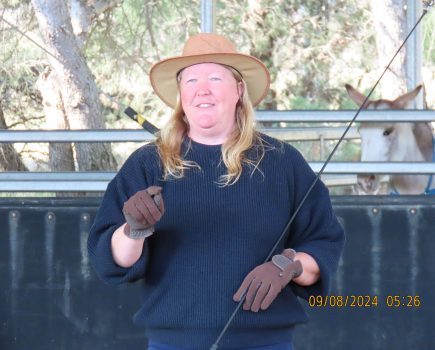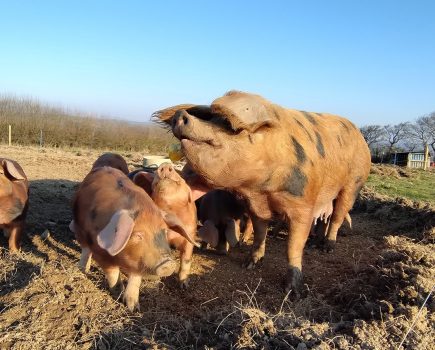Susie Kearley investigates how chickens can help in the therapeutic process
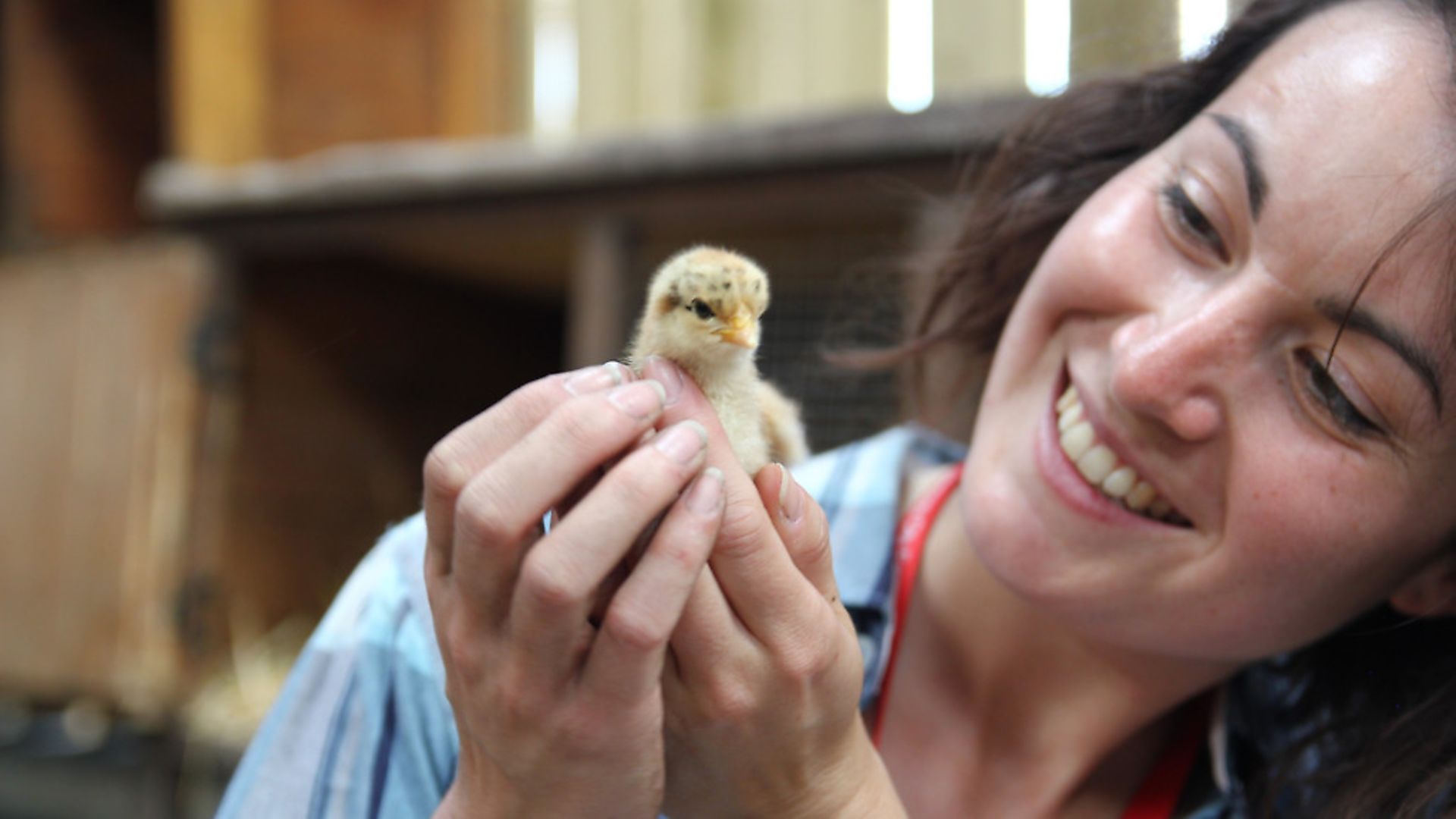
The therapeutic value of taking dogs to visit patients, special needs centres, schools and nursing homes is well known. Even docile cats are sometimes used as therapy animals, providing companionship, confidence and a feeling of wellbeing to people in need. But therapy chickens?
The idea of chickens being used in therapeutic settings has gained momentum in recent years. They boost people’s mood, combat loneliness and isolation among the elderly, and caring for chickens can improve mobility too. Prisoner rehabilitation is perhaps one of the more surprising aspects of chicken therapy, where convicts learn animal care skills while enjoying the calming effect that the birds can bring. Therapy chickens can have a remarkable effect, lifting people’s spirits and staving off depression in a wide range of situations.
Furry tales
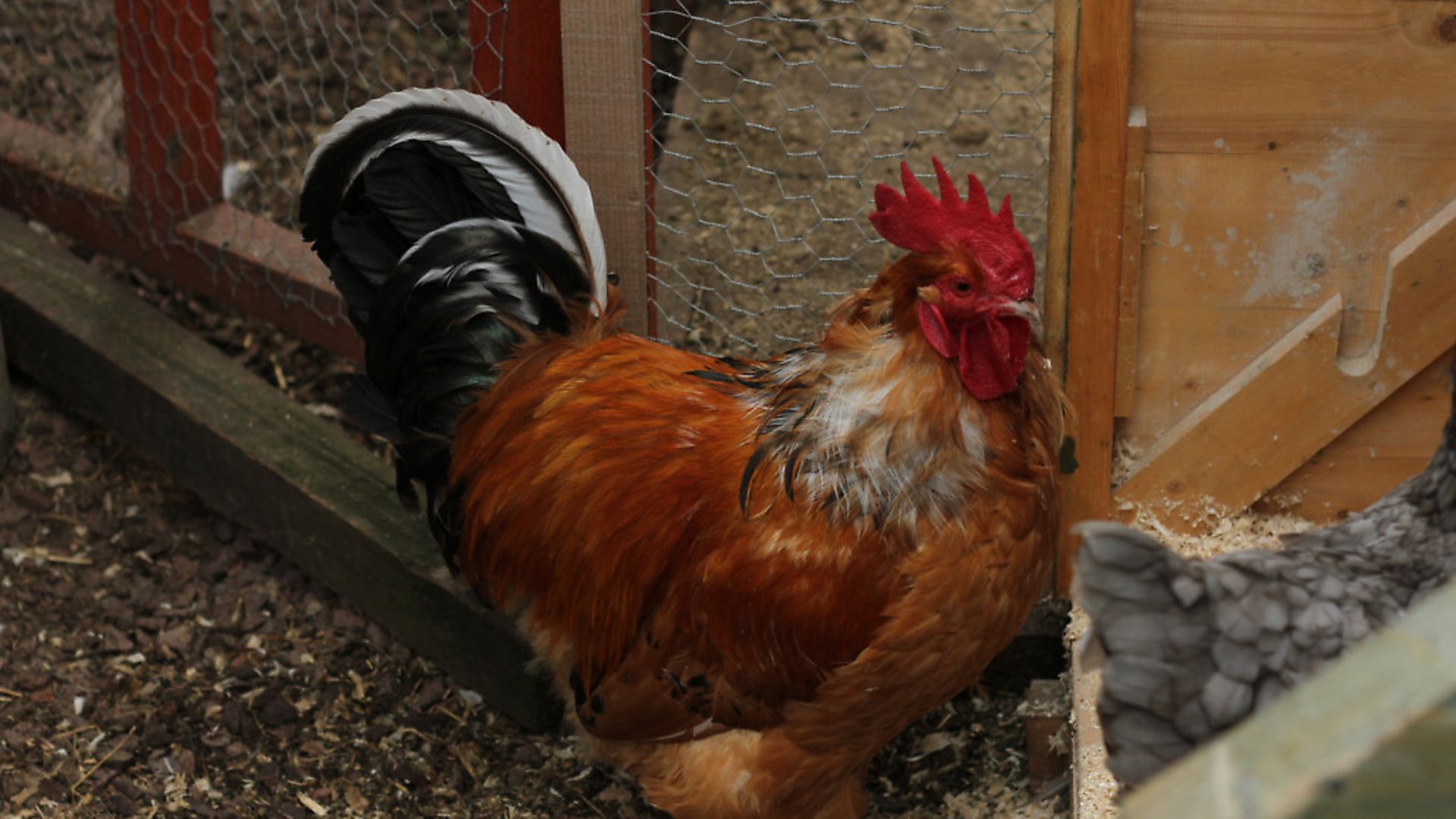
Ione Maria Rojas founded the Furry Tales project at Stepney City Farm in London in 2013. With the help of volunteers, she took Pekin Bantam chickens, rabbits and guinea pigs to care homes and day centres across the capital.
“Living in London is intense,” she says. “So I started volunteering at Stepney City Farm and found the experience beneficial for my wellbeing. I’d had a long-term interest in art therapies and elderly health and I’d volunteered in a couple of care homes running painting workshops. My positive experience with the farm animals made me think that the elderly people would benefit from meeting the animals too. I took a few small animals into a care home and it snowballed from there.”
The reaction from elderly people to seeing chickens arrive in their communal lounge was delightful. They were smiling broadly and keen to participate.
“Pekin bantams are known for being really docile,” says Ione. “They like to be stroked and enjoy perching on people’s laps, making them the perfect therapy animal. The experience promotes interaction and can make those who are very reserved and withdrawn want to join in and hold a chicken. For some people who kept chickens in their youth, it brings back happy memories.”
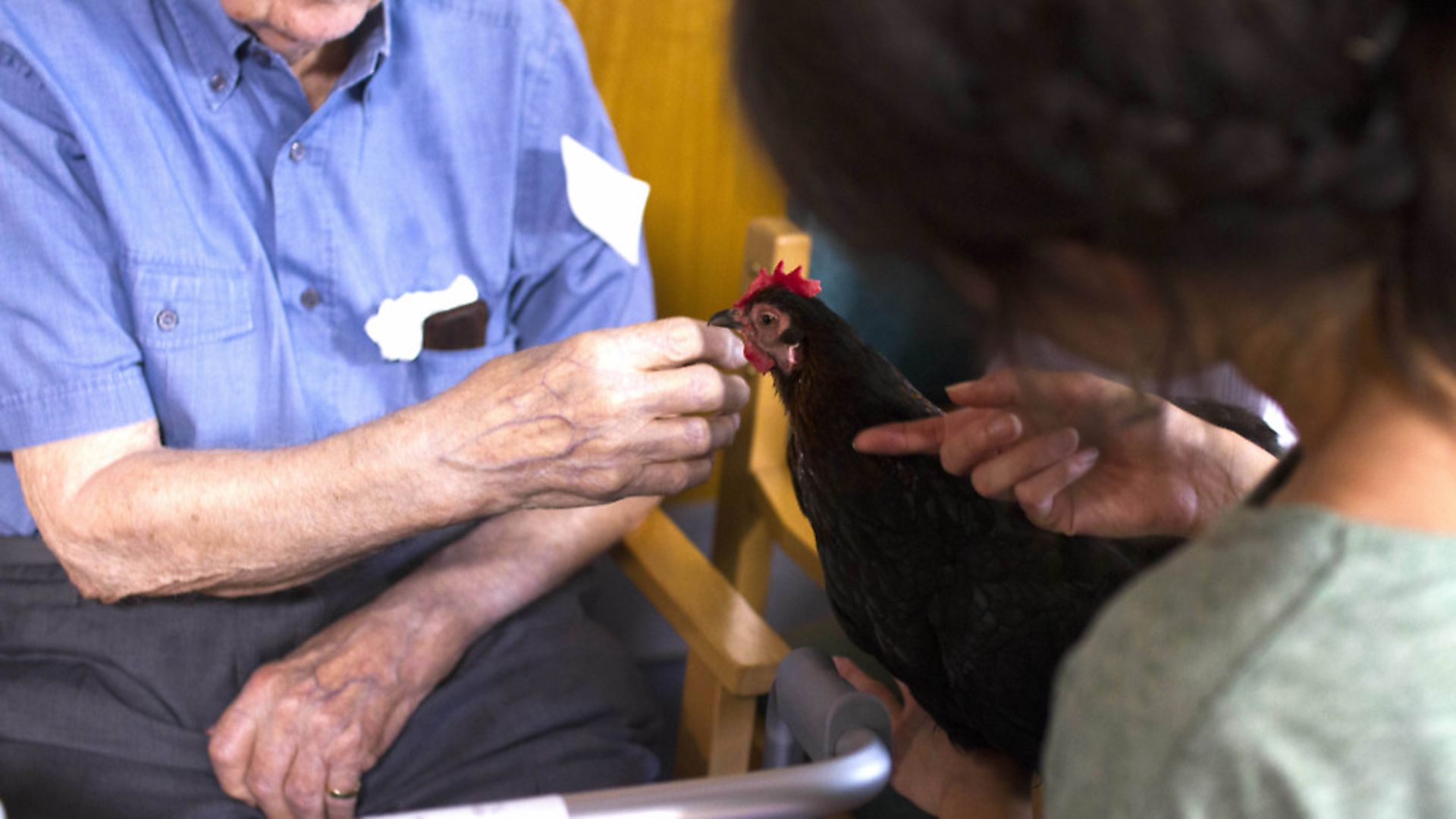
The chickens are very content sitting on people’s laps. It’s a talking point because people think they’ll run away. But the hens are born and raised on the farm. “They get a lot of handling, so they’re used to it,” says Ione.
In 2015, Ione visited animal therapy centres across America to learn best practice and share experiences. At the Life Care Center of Nashoba Valley in Littleton, Massachusetts, she learnt about their hugely successful animal therapy programme. The residents with Alzheimer’s disease benefit hugely from watching the chickens and say the experience is calming. One resident started feeding the chickens to improve his mobility.
In Kansas, a day care worker showed the clients how to care for chickens and encouraged those with DIY skills to build a coop. They thoroughly enjoyed building the hen house and got a huge sense of satisfaction from completing the job.
When Ione returned from her trip, she was struck by the range of physical, emotional, cognitive and social benefits she had observed, including faster healing times in patients and greater community cohesion when animals were involved in treatment regimes. It opened her eyes to new ideas, some of which were integrated into her work in the UK.
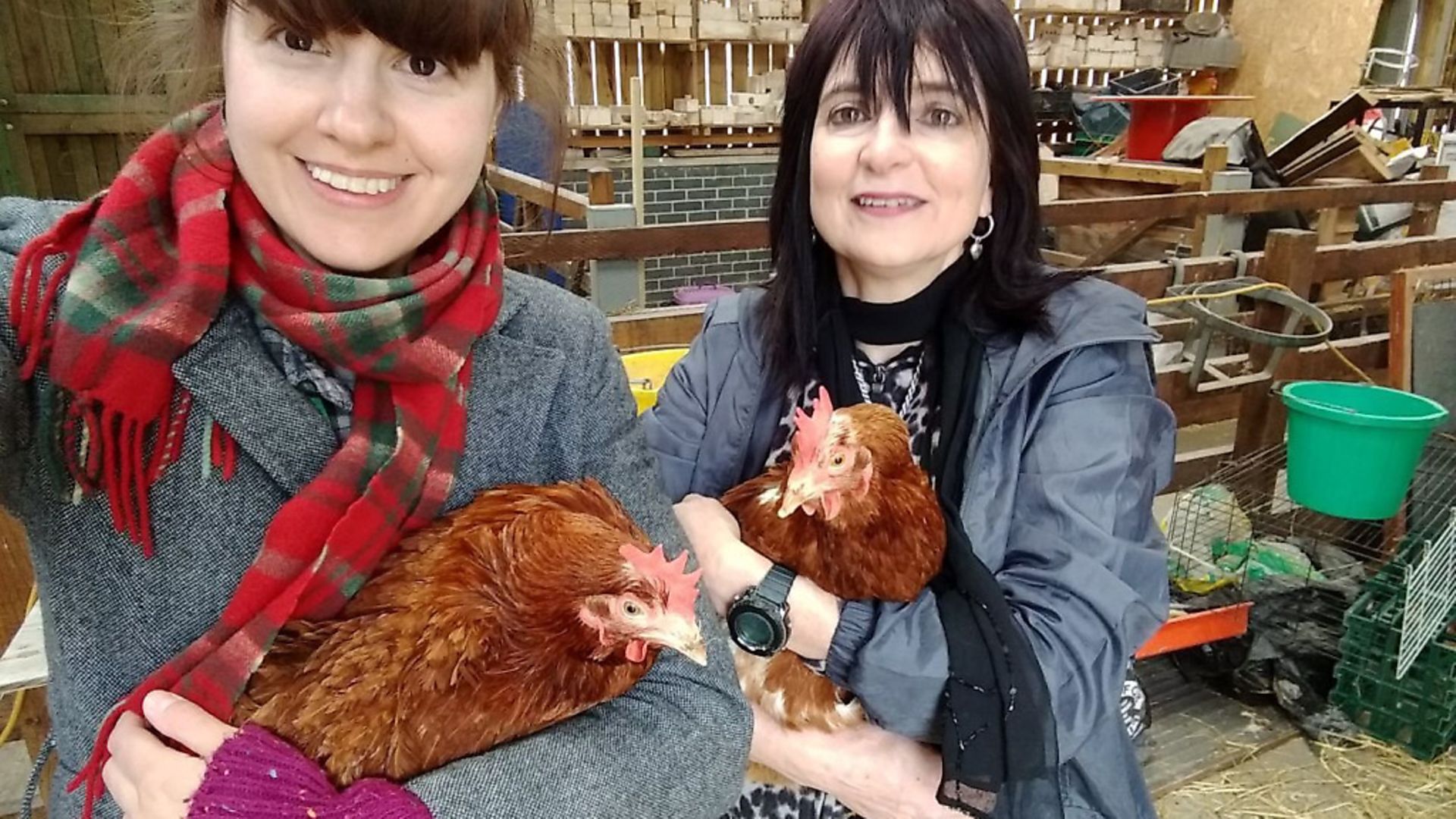
Then, in March 2017, Ione handed over the responsibility for Furry Tales to her co-workers, Jane and Merlin.
Jane says: “We’ve now developed a series of outreach packages where we take chickens and other animals to a hospital dementia ward, residential homes and to sheltered housing, visiting each location for eight weeks. Some of our clients are isolated or socially excluded, so we help to combat that, generate conversations and promote positive relationships. Those who enjoyed it can continue the experience by coming along to our weekly Friday afternoon drop-in sessions at the farm.
“Some of our beneficiaries are living independently, but they struggle to get out. Some are in wheelchairs or have mobility problems. We can help with a range of issues, including anxiety and depression. Although most beneficiaries are older, we do accept people as young as 25 if we can identify a need and see that they’ll benefit from the experience. They get a mini-tour of the farm and one-to-one contact with the chickens.”
Although the work can be therapeutic, Jane is keen to stress that they don’t actually undertake ‘therapy’. “We offer animal assisted interventions and activities,” she says.
Combating loneliness
Elsewhere, a charity called Henpower, set up in 2011 in Gateshead, encourages hen-keeping as a way to combat loneliness and depression among older people. A study by Northumbria University published in 2014 found that Henpower improved the health and wellbeing of older people and reduced loneliness and depression.
Henpower encourages participants to take full responsibility for the care of their chickens, which means they are not just petting them — they’re building coops, cleaning out the birds and feeding them while learning about all the different aspects of chicken care.
Volunteers for Henpower don’t just visit care environments. They also take therapy chickens to schools and events where people can enjoy interaction with the birds and learn about their care needs.
Today therapy chickens are used around the world to help those with health and mobility issues to enjoy life and have fun. Even people who are living independently can benefit from chicken therapy. It helps people to get outside and socialise. Residents in homes are more inclined to go outdoors if they can interact with animals when they get there — people are motivated to push themselves to achieve greater mobility and independence. The chickens make people laugh and bring simple pleasures to those who face huge health challenges, disabilities, or are experiencing serious emotional problems.
Changing lives
Paul Checkley is a keen advocate of the therapeutic value of chickens. He suffered abuse as a child and, as an adult, he couldn’t shake off the feelings of shame and depression. He had a full psychotic breakdown, retired from his job on medical grounds and then a friend suggested he adopt battery hens. “They’ve had a horrible life, just like you,” his friend persisted.
Paul looked into it and then decided to adopt four hens from the British Hen Welfare Trust — they were featherless and terrified from their ordeal. But as he watched them grow into beautiful confident chickens, he found it immensely rewarding and the experience gave him the strength to fight his own demons. “The hens accept me. They calm me down and I feel that through the horrors in both their lives and mine we connect,” he told The Guardian.
The perfect therapy chicken
A good therapy chicken needs to enjoy being handled, so the process of socialisation early in life is important. They shouldn’t startle easily and they should have an easy-going temperament.
Ione explains how staff and volunteers from the Furry Tales project approach the residents in care homes: “Unless people are really keen to hold the chickens right away, we handle them first and approach the residents slowly, enabling them to get a good look at the birds and feel at ease around them. We’ll hold a chicken in front of them and if the resident has a desire to have the chicken on their knee, we’ll put the chicken on their lap.
“There’s always a volunteer present, so the beneficiaries can stroke the animal and be as close or as far away as they want, for as long as they want. They have a plastic mole-skin cover on their lap to catch any little accidents.
“The chickens’ training is called ‘animal socialising’. It involves getting them used to being with people and being handled. When they’re very young, volunteers sit in their enclosure with them, so they get used to being around people.
“We’re not immune from the occasional mishap. During a visit to one care home, a chicken escaped into the courtyard and we ended up with three volunteers running around after this chicken,” says Ione. “For a while it looked like we might lose her. The residents thought it was hilarious and it all ended well.”
Best practice
In the UK, therapy chickens are not certified because there is no official accreditation process for therapy chickens or Animal Assisted Interventions. There are, however, best practice guidelines to which many organisations in the UK and around the world adhere:
? Society for Companionship Animal Studies (SCAS) Code of Practice;
? International Association of Human-Animal Interaction Organisations’ 2014 White Paper on AAI.
An interactive online course, leading to a Therapy Chicken Handler Certificate, teaches the skills needed for chicken therapy, including handling, public speaking, transportation and bird safety. The course explores how to read your bird’s stress signals and anticipate their responses and behaviour.
MORE: www.chickensandyou.com/course_therapy_chicken.html
Non-judgmental opinions
Therapy chickens are also being used to rehabilitate prisoners. At The State Hospital in Scotland, where 75% of patients have schizophrenia, chickens roam the animal garden. You might think that the patients are a threat to the animals, but they treat them with kindness.
Animals offer non-judgemental companionship, so the sessions can be the first positive relationship that some criminals experience in their lives, opening the door to new positive attitudes and successful rehabilitation. It is therapeutic and calming and it can enhance their wellbeing. There are trained staff on hand to ensure the experience is a positive one for both the prisoner and the animal.
Ashworth Hospital in Merseyside looks after dangerous criminals, using therapy chickens to help them deal with a wide range of mental health issues. One patient who was hurting himself in prison and was suicidal was sent to the hospital to recover. He said that caring for the chickens helped him escape from the realities of life for a while. “I enjoy it. It’s therapeutic. It helps me,” he notes.
In Edinburgh Prison, the prisoners got some hens, built a coop and then used the eggs in cookery lessons. One prisoner said the chickens brightened up her day.
On Rikers Island, the main prison in New York City, the Horticulture Society of New York administers a horticulture course called the Greenhouse Program, which trains prisoners to be gardeners and provides employment in gardening roles in the city following their release. Part of this experience is working with chickens, where they have the opportunity to nurture the birds. For some prisoners, learning about horticulture and animal care provides a valuable connection to nature which begins a healing process.
Image(s) provided by:
Archant
Archant
Archant
Archant




